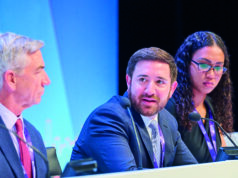
Trainee interventional cardiologists have raised concerns that reductions in patient numbers undergoing cardiac catheterisation procedures during the pandemic is impeding their professional development.
Sabeeda Kadavath (University of Arkansas for Medical Sciences, Little Rock, USA) and colleagues from the Cardiovascular Fellows Consortium write in the American Journal of Cardiology: “With fewer patients receiving cardiac care, hands-on training in the cardiac catheterisation laboratory may be limited. There is a concern amongst fellows that the time period away from the cardiac catheterisation laboratory may impede their ability to hone their skill set.”
The Cardiovascular Fellows Consortium was formed by trainees across the US who collaborated through social media as a response to the COVID-19 pandemic. They undertook a study to understand the change in procedural volumes during the pandemic.
Through the consortium they collected all cardiac procedures performed by invasive cardiology including cardiac catheterisations, coronary angiograms, and percutaneous coronary, endovascular, and structural interventions. This data was collected at 12 fellowship training sites across the US, between 1 March and 15 April 2020, and compared to the corresponding time period in 2019. Data was obtained through an electronic query of each site’s laboratory database without accessing patient data. These cases were performed at the discretion of each site’s respective institution and the treating physicians.
Participating sites in the USA included seven in Michigan, one in New York (Lenox Hill Hospital), Metro Health in Cleveland, and the University of Arkansas for Medical Sciences in Little Rock. Ochsner-Louisiana State University in Shreveport and the University of Colorado Health in Aurora also took part.
Characteristics were summarised using descriptive statistics as a percentage for categorical variables. The per cent change was calculated and expressed as a median change with interquartile range (IQR).
A total of 2,548 procedures were performed at the 12 sites compared to 4,671 procedures performed during the same time period in 2019. The median change in volume in 2020 when compared to 2019 was -47% (IQR -58% to -48%). The case volume decreased at 11 of the 12 sites. The largest decline occurred between 1 April and 15 April 2020 at all sites except one, with a median change in case volume of -80% (IQR -86.2% to -72.5%).
Kadavath et al say: “The COVID-19 pandemic has seemingly changed our healthcare system for the foreseeable future. With the limitations in allocated resources, elective procedures are being deferred. This is suggested from our study findings which show a decline in cardiac catheterisation laboratory procedures in the majority of participating sites during the COVID-19 pandemic. Our findings align with observations made in Spain which showed a 48% decline in diagnostic procedures. Additionally, a decline in patients presenting with acute coronary syndrome (ACS) has been reported, which also contributes to the overall reduction in cardiac catheterisation laboratory volume.”
The Consortium’s findings are also borne out by an extensive worldwide survey carried out by the European Society of Cardiology (ESC), published last month in the European Heart Journal—Quality of Care and Clinical Outcomes, that found that the number of heart attack patients seeking urgent hospital care has dropped by more than 50% during the COVID-19 outbreak. A separate survey of interventional cardiologists conducted by the European Association of Percutaneous Cardiovascular Intervention (EAPCI), a chapter of the ESC, revealed a drastic reduction in the number of interventional procedures being performed.
Kadavath and colleagues add: “The COVID-19 pandemic occurred in the last quarter of the academic year when FITs [fellows in training] are expected to consolidate case-based learning, technical skills, and clinical judgment in preparation for advancement in their careers. The Accreditation Council for Graduate Medical Education (ACGME) has recognised the reduction in patient volume, in addition to the redeployment of training staff to support critical services.”










